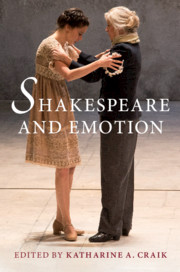Book contents
- Shakespeare and Emotion
- Shakespeare and Emotion
- Copyright page
- Contents
- Figures
- Contributors
- Acknowledgements
- Note on Text
- Introduction
- Part I Contexts
- Chapter 1 Rhetoric
- Chapter 2 Medicine
- Chapter 3 Religion
- Chapter 4 Character
- Chapter 5 Inheritance and Innovation
- Chapter 6 Communities
- Chapter 7 Audiences
- Chapter 8 Acting
- Chapter 9 Bollywood
- Chapter 10 Language
- Chapter 11 Emotional Labour
- Chapter 12 Passionate Shakespeare
- Part II Emotions
- Bibliography
- Index
Chapter 2 - Medicine
King Lear, Macbeth, The Tempest
from Part I - Contexts
Published online by Cambridge University Press: 01 October 2020
- Shakespeare and Emotion
- Shakespeare and Emotion
- Copyright page
- Contents
- Figures
- Contributors
- Acknowledgements
- Note on Text
- Introduction
- Part I Contexts
- Chapter 1 Rhetoric
- Chapter 2 Medicine
- Chapter 3 Religion
- Chapter 4 Character
- Chapter 5 Inheritance and Innovation
- Chapter 6 Communities
- Chapter 7 Audiences
- Chapter 8 Acting
- Chapter 9 Bollywood
- Chapter 10 Language
- Chapter 11 Emotional Labour
- Chapter 12 Passionate Shakespeare
- Part II Emotions
- Bibliography
- Index
Summary
This chapter explores how medical knowledge shaped Shakespeare’s figuration of the passions. According to ancient writers, emotions originate in the organic soul, moving continually among the body, mind, and psyche. The passions are thus psychic in their inception and interstitial in their operations, both within the individual subject and in their transactions between people. Early modern emotions also shuttle between human beings and the meteorological world around them, as Macbeth, King Lear, and The Tempest exemplify. I supplement the precedence granted to Hippocratic and Galenic humoral theory in recent scholarship by charting how other ancient medical and natural philosophical sources informed early modern constructions of emotion. Emergent theories in medicine and natural philosophy (Vesalian anatomy, Paracelsian homeopathy) augmented existing understandings of the passions, as did vernacular medical treatises and popular medical controversies. While Shakespeare did not adhere in any systematic way to particular medical paradigms, their concepts and idioms influenced his eclectic representation of the passions. His plays depict the fundamentally interactive and dynamic nature of the emotions, the psychic intricacy of their physiological, mental, and imaginative functions, and the intensity of their intersubjective transmissions.
Keywords
- Type
- Chapter
- Information
- Shakespeare and Emotion , pp. 34 - 48Publisher: Cambridge University PressPrint publication year: 2020
- 2
- Cited by



